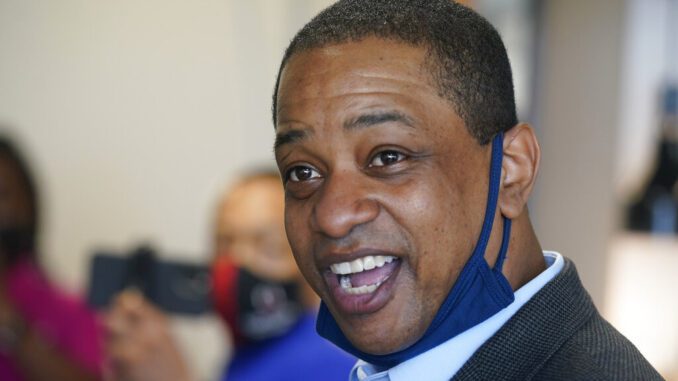
 Last week, things got a little — okay, a lot — weird in Virginia’s Democratic gubernatorial primary race.
Last week, things got a little — okay, a lot — weird in Virginia’s Democratic gubernatorial primary race.
The race hadn’t gotten a lot of attention nationally up until a week ago, because the state’s former governor, Terry McAuliffe, is considered a lock for the Democratic nomination. As the New York Times noted in a recent piece, McAuliffe “is regarded as a clear front-runner, partly because of his formidable connections” in the Democratic party, including his long-standing alliances with prominent black Democrats in the state.
But things veered off course a bit in the race during a debate last Tuesday that saw McAuliffe’s four opponents take jabs at him from the left. His three African-American opponents, Lt. Gov. Justin Fairfax, state Sen. Jennifer McClellan, and former House of Delegates member Jennifer Carroll Foy, in particular, tried to chip into McAuliffe’s perceived support in Virginia’s black community by pointing to the work they’ve done over the years.
But it was Fairfax who took center stage during the debate when he was asked towards the end of it about police reform.
“The murder of George Floyd was horrific,” Fairfax stated. “But it recalls a history in Virginia and in our nation where African-Americans, in particular African-American men, are presumed to be guilty, are treated inhumanely, are given no due process and have their lives impacted, in some cases taken away in an instant.”
Fairfax then pointed to himself as an example of such. Recalling what happened over two years ago after he was accused by two women of sexual assault, Fairfax reminded people that “[e]veryone here on the stage called for my immediate resignation, including Terry McAuliffe three minutes after a press release came out. He treated me like George Floyd; he treated me like Emmett Till — no due process, immediately assumed my guilt.”
Judging by the Twitter reactions alone, Fairfax’s comments were not well-received — not among voters who were watching nor the reporters who were live-tweeting the debate.
New York Times political reporter Astead Herndon, who is African-American, set the record straight rather quickly after Fairfax made the remarks.
“‘What happened to me is like what happened to George Floyd and Emmett Till’ is not a thing a living person can say,” Herndon tweeted.
Fairfax’s claim was an especially odd and out-of-touch one to make considering McClellan and Foy had also called for him to step down at the time.
Fairfax’s shocking comparison would not be the last strange thing to take place last week in the Virginia Democratic gubernatorial primary race.
Just two days later, McAuliffe and the state’s current governor, Ralph Northam, appeared publicly together at an event where Northam formally endorsed him.
Normally such an endorsement would not raise eyebrows, but over two years ago, McAuliffe had also called for Northam’s resignation after the college-yearbook scandal where Northam originally admitted to wearing blackface in an old photo. Though Northam took back his statement less than 24 hours after he made it, McAuliffe still called on him to step aside.
“The situation that he has put himself and the Commonwealth of Virginia in is untenable. It’s time for Ralph to step down, and for the Commonwealth to move forward,” McAuliffe said at the time.
But on Thursday, he sang a much different tune.
“Gov. Northam has been leading Virginia through this crisis, so he knows exactly what it’s going to take to rebuild from the pandemic: bold plans and tested leadership,” McAuliffe proclaimed in a statement. “I am honored to have his support.”
Conservative commentator Charles Cooke summed things up accordingly after all that took place in the span of just a few weeks in the race: “Virginia politics is bizarre.”
Indeed.
Media analyst Stacey Matthews has also written under the pseudonym Sister Toldjah and is a regular contributor to RedState and Legal Insurrection.



